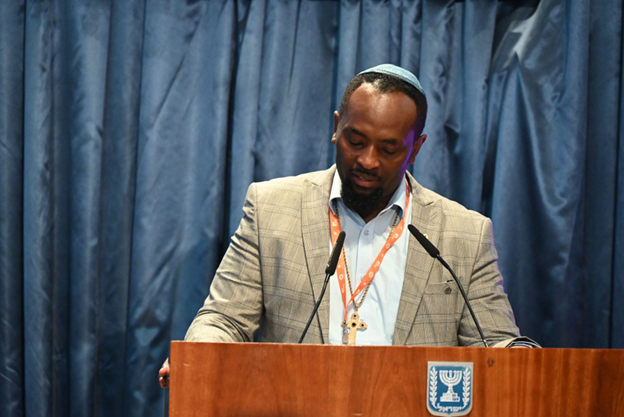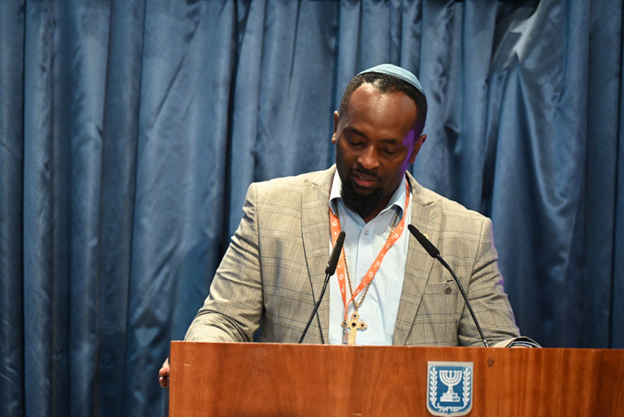Some 100 members of Christian media from around the world have signed a “covenant” on journalistic ethics as they relate to the State of Israel.
The covenant, presented last Thursday at the Christian Media Summit in Jerusalem—an event sponsored by the Government Press Office, the Foreign Ministry and the International Fellowship of Christians and Jews—was designed to turn the learnings of the five-day seminar into concrete action.
1 View gallery


Bishop Dennis Nthumbi presents The International Christian Media Accord on Journalistic Ethics and the State of the Land of Israel
(Photo: Courtesy)
Its key principles, written by Bishop Dennis Nthumbi, Africa Director of the Israel Allies Foundation, begin with a commitment to “uphold the truth” by consistently and accurately reporting that Judea and Samaria are “legally disputed” and not “occupied” territories. The second principle affirms Israeli heritage in the land of Israel by educating audiences about the “unbroken 3,000-year connection of the Jewish people to the entire Land of Israel.” The final principle calls for supporting the “responsible security governance” of Israel in Gaza and the Golan Heights.
The covenant was a private initiative and not an official product of the summit.
This year’s summit, held from November 2 to 6, was the seventh such gathering, bringing together journalists and other media professionals from around the world. Participants toured Judea and Samaria, as well as the Gaza Strip, and took part in briefings and discussions at the Foreign Ministry.
“The war exposed our underbelly, and that underbelly was the fact that Christian media have not been united in combating disinformation, misinformation and propaganda against Israel,” Nthumbi told ynet Global. “I sought to bring together a unified front and build capacity, so we could better deal with this whole propaganda issue, not only against Israel but the entire Jewish community globally.”
He added that in the early days of the conference, he realized that despite the powerful speeches and panels, the roughly 150 participants would return home unchanged unless they committed to something meaningful.
“We know the why, but we don’t know the how,” he said about the battle for truthful reporting on Israel. “We don’t know how to fight a united enemy with an AK-47 in one hand and a camera in the other hand. The camera is winning the war. The enemy is winning the war on information and the hearts and minds of the people. They have managed to convince the world that they are right and the truth is wrong. A bunch of terrorists have duped the world.”
The first member of the Christian media to sign the covenant was Humphrey Birkenstock, CEO of the South African community radio station Rainbow FM. He said signing it was a “game changer” for him, returning his role to the “spirit of covenant with God and commitment to truth.”
Birkenstock described how his station is “facing the storm” in South Africa, where the government—responsible for granting broadcast licenses—is firmly opposed to Israel. “The government always has a wry eye on what we say about our government and government partners overseas,” he said.
Even so, Birkenstock told Ynet Global that he believes Christian voices represent the silent majority. Roughly 85% of South Africans are Christian, he noted, and “we firmly believe all of these principles. I know for a fact that in the hearts of South Africans, they do support Israel and do support the truth and the word of God.”
The covenant explains that its signees are “guided by the unerring standard of the Holy Scriptures and the foundational principles of international law.”
It states: “The sovereignty of the Jewish people over the Land of Israel is not a contemporary political claim but the fulfillment of an eternal, unilateral covenant established by God. This is the bedrock of our understanding.”
“The establishment of the Jewish National Home, including Judea, Samaria and the Golan Heights, was explicitly mandated by the supreme international body of its time,” the document continues. “A subsequent legally binding instrument has never superseded this legal right.”
The covenant also calls for establishing three new bodies:
-
A Judeo-Christian Media Council, which would serve as the central coordinating body for signatories, would establish a code of ethics for reporting on Israel and provide tools for rapidly responding to misinformation.
-
The Judeo-Christian Media and Research Institute would serve as an academic and research arm for signatories, offering training to equip journalists with theological, historical and legal knowledge to report accurately.
-
A “Boots on the Ground” Journalism Initiative, calling for a permanent, rotating fellowship program for Christian journalists to be embedded within communities in Judea, Samaria, the Golan Heights, Jerusalem and the Gaza periphery.
Nthumbi emphasized that these bodies are ideas for now, but he is already receiving calls nearly every day from Christian media outlets eager to take part.
This is not the first initiative of its kind. In February, American Christian Leaders for Israel at the National Religious Broadcasters convention signed a resolution reaffirming the Jewish people’s right to Judea and Samaria. That declaration also affirmed the importance of Jewish sovereignty over the region.
“People need to be equipped in the fastest way possible,” Nthumbi said. “This is warfare now. We need men and women journalists on the frontlines to speak the truth.”
